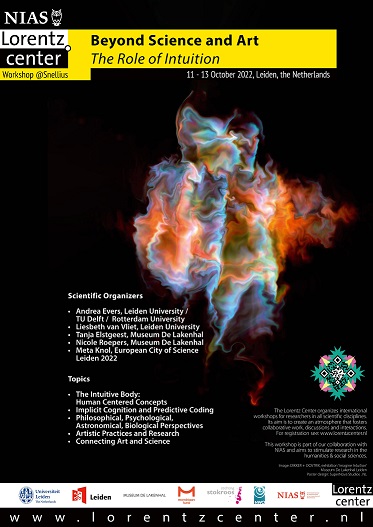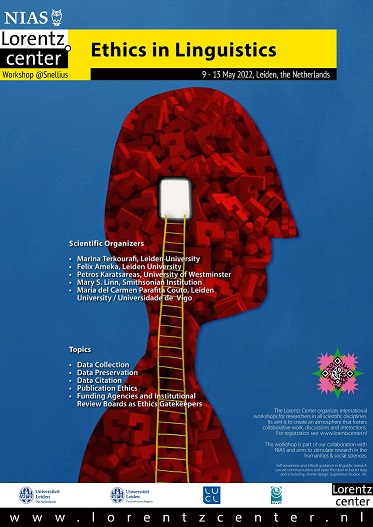Deadlines for submission of workshop applications are 30 January, 30 May and 30 September.
Workshops at the Lorentz Center
There are currently two types of workshops at the Lorentz Center with a humanities and/or social sciences component:
- The NIAS-Lorentz Workshops (NLW) for research that bridges the divide between humanities and/or social sciences and the natural, life and/or technological sciences.
- The SSH Workshops, by which we understand mono-or interdisciplinary workshops in disciplines from the social sciences, humanities or any other field of research outside the natural, life and or technical sciences.
Both aim to produce cutting-edge research through open and informal discussions and stimulating collaboration. Within this framework, workshop organizers are free to decide which format will work best for their needs and their particular project.
Workshops usually last 5 days and are held in either of the two venues at the Lorentz Center, both of which have meeting facilities and offices for all participants. The participants consist of an international group of researchers; typically 40-50 persons for workshops in the Lorentz Center@Oort venue or 20-25 for workshops in the Lorentz Center@Snellius venue. The Lorentz Center provides facilities, organizational support, and partial funding for all workshops.
How to apply
There are three deadlines to submit applications for a Lorentz Center Workshop: 30 January, 30 May and 30 September. The workshop applications should be prepared according to the guidelines shown here and be submitted to draft@lorentzcenter.nl. Applicants are encouraged to contact Henriette Jensenius in an early stage, for information and support on the application. All applications are evaluated by the NIAS-Lorentz Advisory Board and, when applicable, also by specific Lorentz Center advisory board(s). Applicants will be informed within 12 weeks after the submission deadline. The workshop will be held in the period 8 to 16 months after the submission deadline.





Previous NIAS-Lorentz Workshops
2024
Cognitive modeling of complex behavior
Religious imagination in the late medieval Low Countries
Physics & question-answering machines: artificial scientific understanding?
The Road to FAIR and Equitable Science
Fair patterns for online interfaces
Fact, Fake, and Fiction
Criminal Justice Settings, Crime, and Reintegration
Shaping the Future of Forensics with Proteomics
Hormonal fluctuations across the female lifespan: Fostering mental health and wellbeing through all ages
Landscape Biography, A Way Forward
Dealing with Dangerousness
Watch your language: Language Technology and Words in Society
And then what? From Narratives and Scenarios to Climate Action
Preventing psychosis relapse through crosslinguistic prediction models
Methods of Studying Hate and (Violent) Extremism Online
Science and Social Justice: Forging Critical Methods
Colors and visual strategies in structural and cellular biology
Light and colour in nature and art
Biographies of Rulers in the Premodern Islamicate World
Research Environments for Human-Machine Teaming
Archaeological starch research at 25: Pitfalls, progress and potential
21st Century Science Education: What does it mean for Teachers?
2023
Comparing Energy Transition in the European Union and China: Challenges and Opportunities
Data, Personalization, and The Law
COVID-19 Supporting Parents, Adolescents, and Children during Epidemics
Ethics in Caribbean Archaeology: Past, Present, and Future
Exposome expectations in child health
Social Influence Analysis
Revitalizing River Cities: Connecting Biodiversity and Justice
Substance, Set & Setting: Medical, religious and other uses of psychedelics
Automatic Classification of Occupation, Industries, and Job Tasks
Manipulation and Autonomy: Beyond the Dichotomy
Nose Wise: Modelling Smell as a Cultural Phenomenon
Sustainable Development Goals: How do we meet them?
War Trauma and Mass Violence: Culture, Care and Coping in Southeast Asia
Reimagining Value-Creation in Health and Care
Violence Studies – A research agenda
Qualitative research on argumentation
Economics and Human Natures
The Computational Approach to Neuro-Phenomenology
Agent Based Simulations for Societal Resilience in Crisis Situations
Structuring Magic: Towards a Digital Infrastructure of Texts and Artefacts
Towards reporting criteria for observational communication coding
The Future of Muslim Tech: Prospects and Challenges
2022
Water, Ports, and Culture in Cities and Landscapes
Stochasticity in the Life Cycle: From Individuals to Populations
Reimagining Value-Creation in Health and Care
Securing Data in Mesopotamia: New Technologies for Secured Cuneiform Texts
Fairness in Algorithmic Decision Making:A Domain-Specific Approach
The Power of TROPOMI to Bridge African Science and Policy
Artificial Social Intelligence
Complex Dynamic Interactions: Synergies between ABM and QCA
Connecting Minds. Integrating models of cognitive evolution
Ethics in Linguistics
Dynamics of Infectious Disease Spread and Health-related Behaviors
Gold & Mercury | Metals in Transit
Participatory and Cross-Scale Modelling of Social-Ecological Systems
Othering and Polarisation
Conserving Art and Nature
Music beyond fixity and fluidity; preservation and performance as instauration
The 25 ‘Great Challenges’ in Archaeology through an ABM Perspective
What Makes a Good Theory? Unifying Interdisciplinary Perspectives
Algorithmic Technology for Democracy: From Foundations to Applications
Beyond science and art: The role of intuition
Making Sense of Interpretable Machine Learning
Crosslinguistic speech patterns: biosocial markers of psychiatric disorders
Rethinking sex in neuroscience of mental health
Diverse News Recommenders: from concept to implementation
Climate Risks for Infrastructure in Deltas
Curricula vitae as reproductive interfaces in research
The Audible Universe 2
2021
Complex Dynamic Interactions: Synergies between ABM and QCA
Towards a One Health Approach to Study Leprosy
Securing Data in Mesopotamia: New Technologies for Secured Cuneiform Texts
Artificial Social Intelligence 2021
Explainable Medical AI: Ethics, Epistemology, and Formal Methods
Developing Models of the World 2021
Othering and Polarisation 2021
Accountable Machine Learning Algorithms: what do practitioners need? 2021
The Paradox of Genres in Discourse 2021
Advancing Cross-Professional Work in Education 2021
Perspectives on Scientific Error: Parsing History and Comparing Viewpoints
Enacting Chance: Ignorance, Insight and Intuition
The Audible Universe
The 25 ‘Great Challenges’ in Archaeology through an ABM Perspective
The Politics of Climate Engineering: Arenas, Actors, Governance Challenges 2021
Language Development, Diagnosis and Assessment in School Ages
Communicating Science in a Democratic Society
Stochasticity and Heterogeneity in Life Cycles: Individuals to Populations 2021
The Scientific Conference: Past, Present, and Future
Speech as PII: Ethics & Usability in vis-à-vis with Security & Privacy
Green Conservation Materials for European Heritage
The Turks are Coming! The Popular Outreach of Turkish TV Series
Hack the Hackathon: Shaping the Future of Hackathon Research and Practice
The Future of Mendelian Randomization Studies 2021
